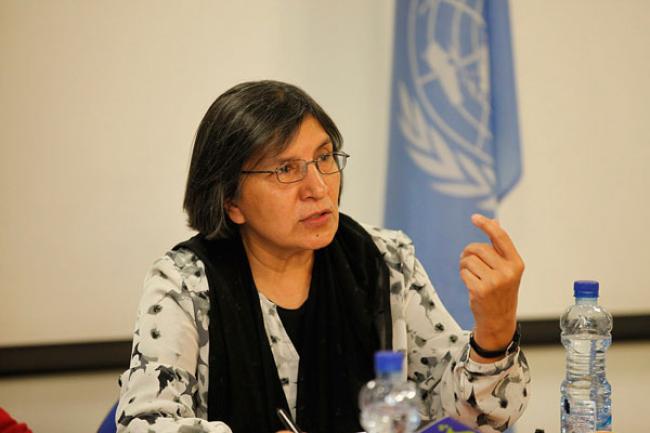14 Nov 2014

Wrapping up a nine-day official visit to the country, Manjoo warned in a statement that violence against women in Afghanistan continues to be a source of deep concern, despite positive legislative and institutional developments brought forward amid a situation of insecurity throughout the country.
“Accountability for all crimes committed against women and girls, the empowerment of women, and the transformation of society, need to remain a focus for the Government of Afghanistan, independent State institutions, civil society organizations and also the international community,” the expert stressed.
“It is imperative that the best interests of all women and girls in Afghanistan should guide the response of relevant stakeholders to ensure coherent and sustainable solutions to address the individual, institutional and structural causes and consequences of violence against women and girls,” she added.
During her visit, which ran from 4 to 10 November, Manjoo said she confirmed, through reports and interviews, the “continuing prevalence of different manifestations of violence against women and girls in both the public and private spheres.”
These include violence perpetrated by husbands and other relatives; violence linked to early and forced marriages – including baad (the exchange of girls for dispute resolution) and baadal (exchange marriages); incest; so-called honour crimes; and self-immolation and self-harm due to domestic violence and forced marriage practices.
Other manifestations of violence consist of targeted killings of women; sexual harassment in the workplace and in public spaces; and the rape of women and girls, the Special Rapporteur noted.
The issue of access to justice and to justice itself for women and girls – in both the formal justice system and informal dispute resolution forums – was also a source of deep concern, Manjoo said.
“In numerous interviews, it was stated that the formal justice system was deficient in many respects, including being inaccessible, unresponsive, corrupt, and untrustworthy, especially as regards matters related to women’s rights,” she noted.
When reporting crimes committed against them, Manjoo said that many women and girls do not register complaints due to their lack of knowledge of the law and its protective remedial provisions; fear of reprisal from the perpetrators and family members; financial and other constraints, including the lack of freedom of movement; and fear of being treated as criminals instead of victi
Many interviewees alleged that they had been charged for “moral crimes,” including when fleeing domestic violence and early or forced marriages, the Special Rapporteur said. Women and girls who try to escape from situations of violence or abuse are often condemned and shunned by their families, communities and the authorities, and are threatened with death.
Moreover, Manjoo said shelters are viewed by many as institutions that encourage women to leave home; to behave immorally and outside of what is traditionally considered “acceptable” in a conservative and religious society; as prostitution houses; and as establishments that are causing the break-up of families.
However, interviewees in shelters that she visited expressed their gratitude that these mechanisms exist, as they are “the only alternative of escape from a life of violence,” she noted.
“Over the past 15 years, several legislative and institutional advances have been made towards the promotion of human rights broadly and women’s rights in particular,” Manjoo said, recalling the creation of a national human rights institution, a ministry for women’s affairs provincial departments of women’s affairs, human rights and gender units in some ministries, and the enactment of landmark legislation on the elimination of violence against women.
The Special Rapporteur said she will discuss her findings in the comprehensive report she will present to the UN Human Rights Council in June 2015.
Special Rapporteur on violence against women, Rashida Manjoo, addresses a press conference in Kabul, Afghanistan. Photo: UNAMA/Fardin Waezi